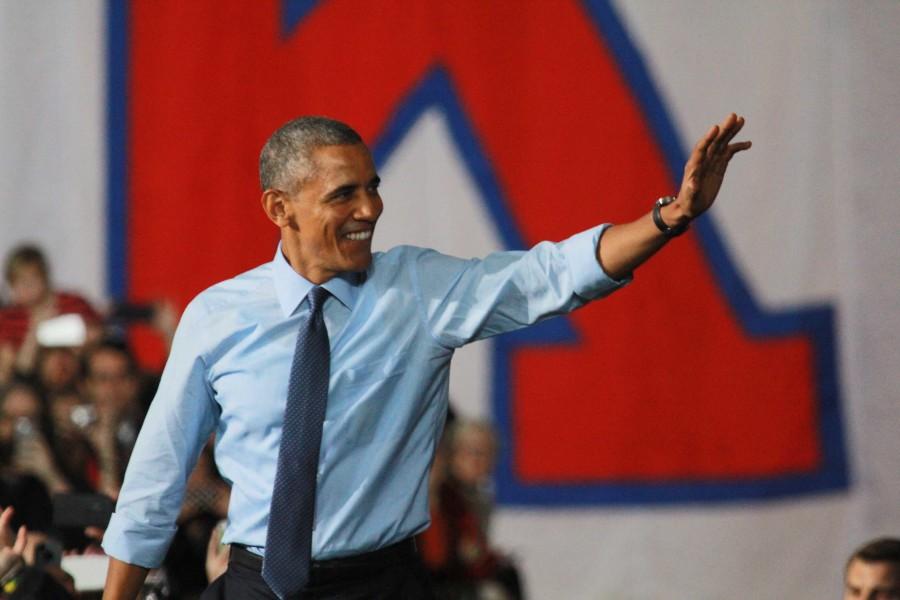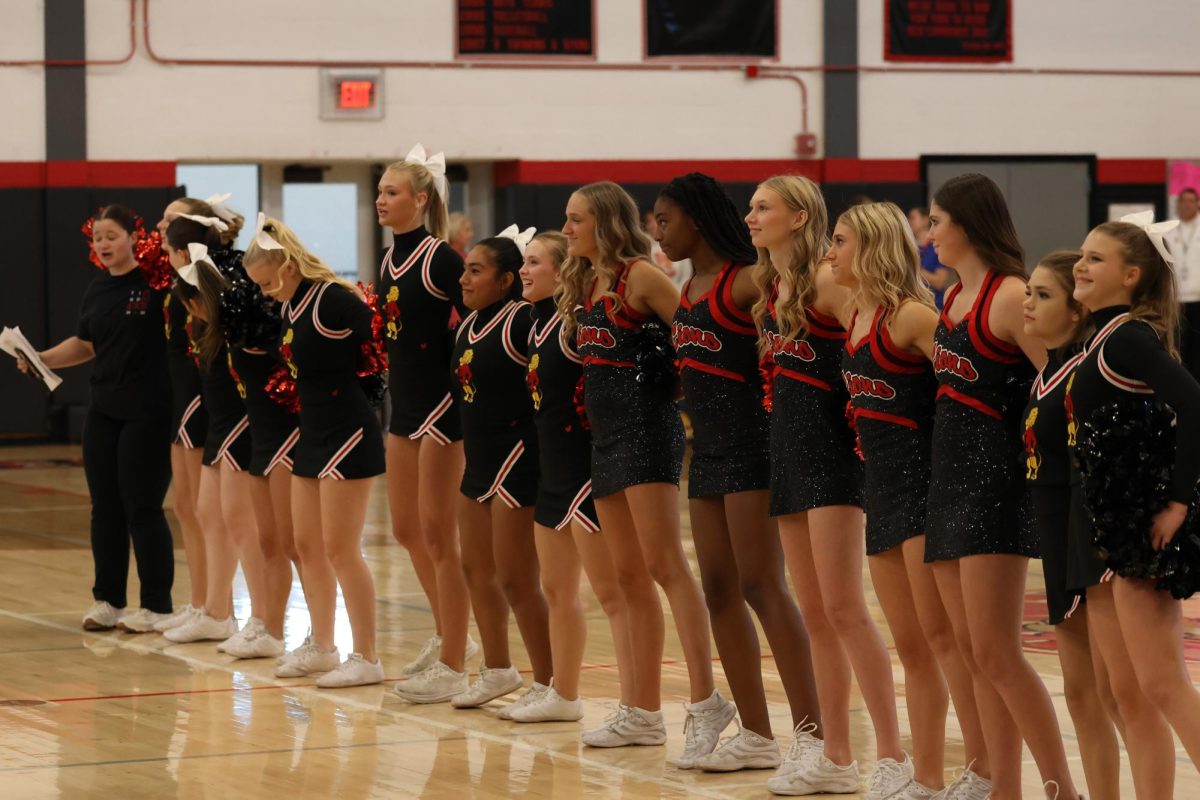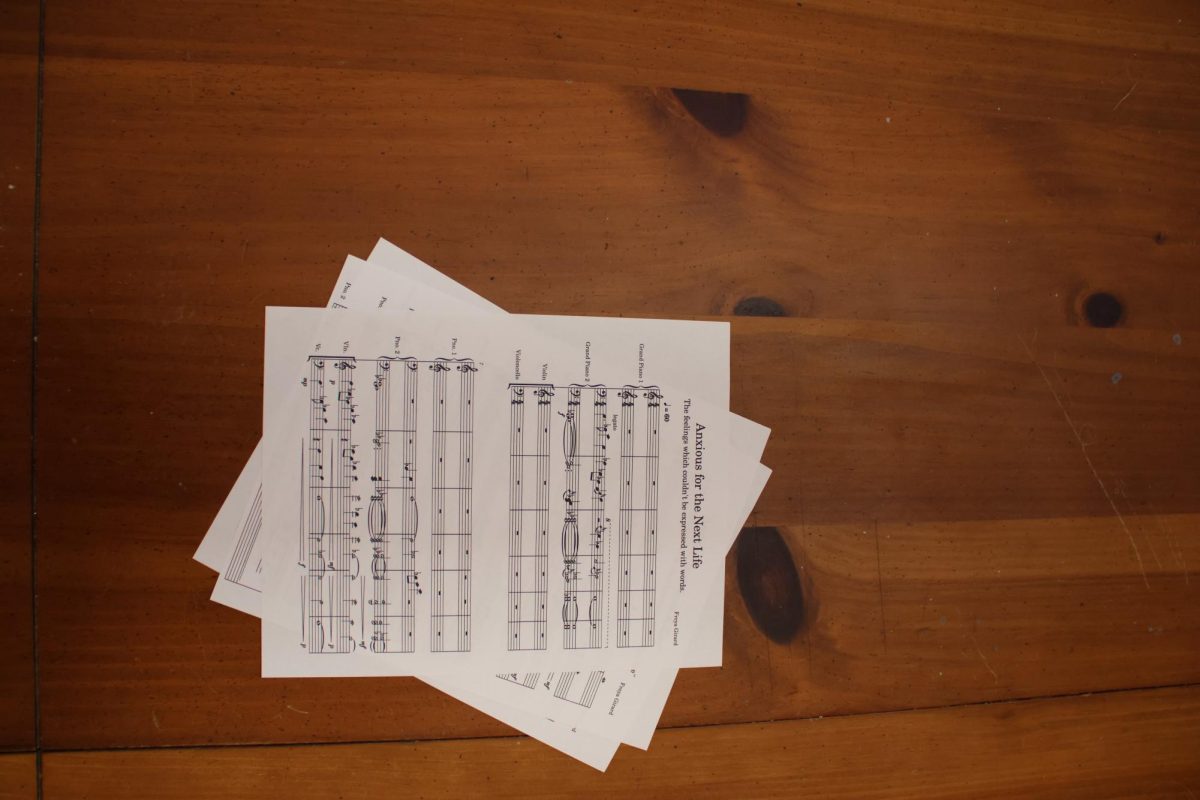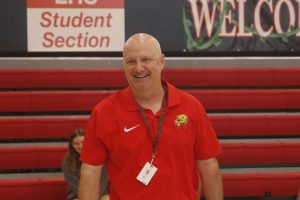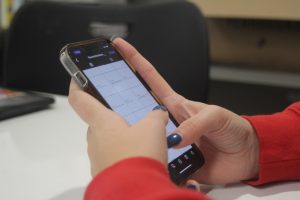Presidental address targets students
Obama takes State of the Union to KU, discusses changes to education
Greeting the seven thousand Lawrence citizens that crowded Anchutez Athletic Pavilion, President Barack Obama gave his speech at KU on Jan. 22 after his State of the Union.
February 4, 2015
LHS graduates Eric Martinez, Kayven Pottker, and Natasha Hurt queued up at the doors of the Anschutz Athletic Pavilion at 1:30 on the morning of Jan. 22, braving sub-freezing temperatures.
The reward? A front-row spot to see the leader of the free world.
“ It was unbelievable,” Martinez said. “Watching the President give a speech in person is an once of a lifetime opportunity, and I wanted to make sure my friends were the closest we could possibly get to the President.”
Coming off of his State of the Union address, President Barack Obama came to Lawrence on Feb 22. to speak about the plan for his final two years in office. His speech focused on his middle class economics principles, from creating high-quality, affordable childcare to raising minimum wage.
The initial press release for the President’s visit went public a week before the KU address. Students, faculty, and alumni were among the thousands of people who stood in line — first to receive tickets at the Douglas County Fairgrounds and then in front of the sports pavilion.
“I found out I was getting a ticket at 7:50 this morning [Feb. 22], and when I got there, I found out I got a VIP ticket, so I was super close to him,” sophomore Julia Randolph said. “It was really exciting.”
President Obama is the fourth sitting president to visit the campus, the first in more than a century. The rare presidential visit came to a city he said “totally gets it.”
“There is a strong Democratic base in Douglas County, so that makes this friendly territory for the President,” said debate coach Jeff Plinsky, who was in the audience.
Obama opened his Lawrence speech by sharing he had just met up with Bill Self and the rest of the KU basketball team. He referred to himself as a “Kansas guy,” sharing his family history tracing back to his grandparents and his mother, who was born in Kansas.
KU students and faculty were honored to host the president during his State of the Union circuit, many said it reflected well on the institution’s name.
“It was a huge honor that he selected KU as a site to advance his agenda for middle class economics,” KU Social Welfare professor Anne Williford said. “ I think it speaks to the national reputation of the university.”
The content of the President’s address was suited to the student audience, as the basis of his middle-class economics campaign is his emphasis on education, from affordable childcare to universal two-year postsecondary degrees.
In a direct address to the students, the President addressed the evolving economy’s way of changing the job market. He told students they will “have to be taking advantage of opportunities” and “adapt to new circumstances.”
The upcoming generation’s ability to fill new jobs, he said, is dependant on the education and certifications they can receive. The President’s agenda for his final two years includes “a new plan to lower the cost of community college to zero.”
He also addressed people who currently struggle with student debt, assuring them he will push for lower monthly payments and lower interest rates on student loans.
The President took his education policies down to an early age, as he elaborated on his plans to make high-quality, affordable early-childhood care accessible to all parents. He referred to to education as “the best investment we can make.”
He bolstered his emphasis on child care on his trip when he visited the Lawrence Head Start chapter on Vermont st.
Williford sees a significant connection between access to childcare and middle-class economic success.
“Too often, students are unable to complete their education because of barriers related to child care and college tuition costs,” she said. “It disproportionately affects women, particularly low-income and ethnic minority women – which is an issue that we as social workers care deeply about.”
In the state of Kansas, education has persisted as a hot-button issue that is often associated with partisan agendas. Plinsky noted that the President’s plans for education are not consistent with current state leadership.
Obama addressed his lack of popularity in conservative-voting Kansas, joking “Coach Self won 10 straight [in Kansas] — I lost two straight” in Kansas, where “the only blue stands for KU.”
Aside from middle-class economics, the President also spent time advocating for bipartisan cooperation, which, along with education reform, impacted students who listened. KU student and former LHS student body president J’Qui Audena said that seeing the sitting President was an important oppertunity regardless of party affiliation.
“There is no one alive in this community who has welcomed a sitting US President to Lawrence,” he said. “Regardless of your politics, this is a part of our role to play in the legislative process.”



